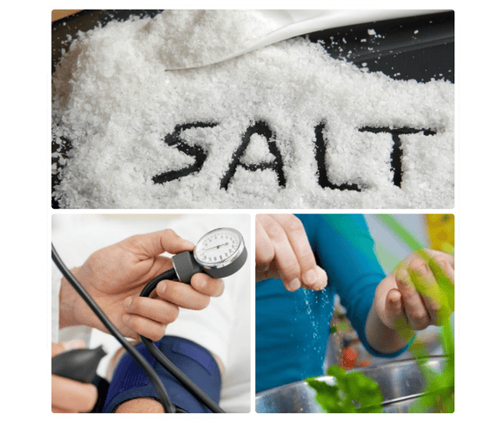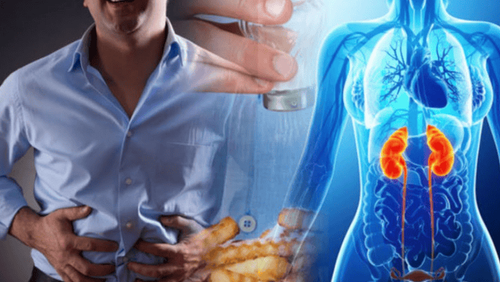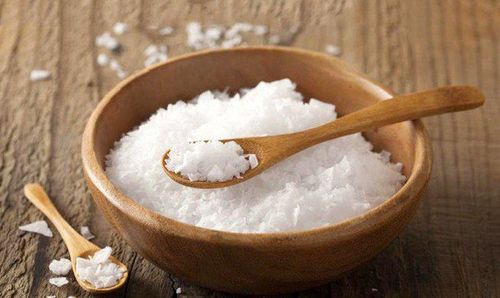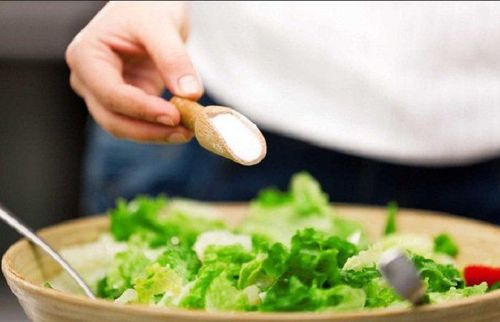This is an automatically translated article.
The article is professionally consulted by Master, Doctor Pham Van Hung - Department of Medical Examination & Internal Medicine - Vinmec Danang International General Hospital.
There are many causes of high blood pressure such as being overweight, eating salty foods, smoking cigarettes, eating a lot of fat,... In which, eating too much salt not only increases the risk of high blood pressure but also can cause high blood pressure. many dangerous cardiovascular diseases.
1. What is high blood pressure?
Hypertension, or hypertension, manifests in a person with a systolic blood pressure ≥ 140 mmHg and/or a diastolic blood pressure ≥ 90 mmHg. When there is a hypertensive crisis, the patient may have manifestations such as blurred vision, dizziness, dizziness, severe headache, ...Sometimes the patient does not have these subjective symptoms but just happens to detect high blood pressure when measuring blood pressure. Because many cases of high blood pressure patients have no unusual symptoms, this is considered one of the silent killer diseases.
2. The relationship between excess salt intake and the risk of hypertension, cardiovascular disease

The mechanism of raising blood pressure of sodium in salt is as follows:
In people with preexisting genetic factors, if you eat a lot of salt, it will increase the permeability of cell membranes to sodium. Na+ ions will be transported much into the smooth muscle cells of the vessel wall, causing water retention in the cells, increasing vascular tone, vasoconstriction, increasing peripheral resistance and leading to increased blood pressure; The salt concentration of body fluids is stable. Eating a lot of salt increases the osmotic pressure in the blood, causing the body to need more water to maintain a stable fluid concentration. To meet this requirement, the feeling of thirst will appear, causing salty eaters to drink a lot of water, leading to an increase in blood volume and increased pressure on the vessel walls. This phenomenon can lead to increased blood pressure in the long run; Eating a lot of salt in combination with factors that cause mental trauma will increase the activity of the sympathetic nervous system, increase the ability to reabsorb sodium in the renal tubules. Large amounts of Na + ions will be introduced into smooth muscle cells, causing vasoconstriction, increasing peripheral resistance and leading to increased blood pressure; Eating salty foods while having high blood pressure may lack the hormone salt excreting factor, causing sodium to accumulate in the body and Na+ ions to continue to be transported more into smooth muscle cells, causing increased blood pressure; Salt increases the sensitivity of the cardiovascular system and kidneys to adrenaline, a substance that causes an increase in blood pressure. Also, when you eat too much salt, blood pressure medications like diuretics won't be able to work as well. And increased blood pressure will increase the work intensity of the cardiovascular system, kidneys and urinary system, causing many health risks such as stroke and heart failure, kidney failure. Especially, if you already have high blood pressure, liver failure, heart failure and kidney failure, the habit of eating a lot of salt will make the disease progress faster.
A high-salt diet in children also has a great effect on blood pressure, increasing the likelihood of high blood pressure and many other diseases. Hypertension in children also has consequences of hypertension in adulthood and increases the risk of complications of high blood pressure due to early disease, prolonged disease duration.
Trắc nghiệm: Muối trong thực phẩm, natri, huyết áp và sức khỏe của bạn
Muối, natri là chất khoáng cần thiết cho cơ thể để duy trì hoạt động ổn định. Tuy nhiên, chế độ ăn thừa muối có nguy cơ cao dẫn tới các vấn đề sức khỏe nghiêm trọng. Cùng làm bài trắc nghiệm sau đây để hiểu hơn về những ảnh hưởng của các khoáng chất này tới huyết áp và sức khỏe bạn thế nào nhé.
Nguồn tham khảo: webmd.com
3. The relationship between excess salt intake and other chronic diseases

Increased urinary calcium excretion, increased risk of osteoporosis and kidney stones; Increased risk of peptic ulcer disease, increased risk of stomach cancer due to destruction of the protective lining of the stomach lining and increased growth of Helicobacter Pylori bacteria; Increased risk of kidney failure due to increased protein in the urine and increased burden on the kidneys; Increased risk of obesity due to increased thirst and increased consumption of beverages, especially soft drinks; Increases fluid retention and edema, especially in patients with cirrhosis and heart failure;
4. Measures to limit salt consumption
Some measures to limit salt intake:Gradually reduce seasoning when cooking: use other spices such as sour, spicy or mixed herbs when processing to increase the taste of food and reduce salinity ; Limit eating processed foods such as sausages, rolls, salted butter, sausages, cold meats, ... because they have used salt in the processing process. If you continue to use salt when cooking these foods, it will increase the amount of salt in your body; Limit the use of salted seasonings when dipping directly on the table such as fish sauce, ketchup, ready-made sauces, ... because they all contain salt. Therefore, users need to taste first or see the amount of salt on food labels when using; When eating at restaurants, eateries need to control the amount of salt loaded into the body; The habit of eating too much salt causes many health consequences. And reducing salt intake is the solution to reduce the risk of high blood pressure, cardiovascular disease as well as many other health problems. Therefore, in order to reduce blood pressure from 2-8 mmHg, reduce the risk of diabetes and cardiovascular disease, it is necessary to pay attention to ensure that the daily salt intake should be less than 5-6g.
Master, Doctor Pham Van Hung has 30 years of experience in examination and treatment of internal diseases, especially in Cardiovascular Internal Medicine: coronary artery, heart failure, heart valve, arrhythmia. ..Master, Doctor Hung used to hold the position of Deputy Head of Internal Cardiology Department and Head of Interventional Cardiology Unit at Da Nang General Hospital and is currently working at Department of Examination and Internal Medicine, Internal Cardiology, Cardiology. Interventional circuit at Vinmec Da Nang International General Hospital.
Please dial HOTLINE for more information or register for an appointment HERE. Download MyVinmec app to make appointments faster and to manage your bookings easily.














